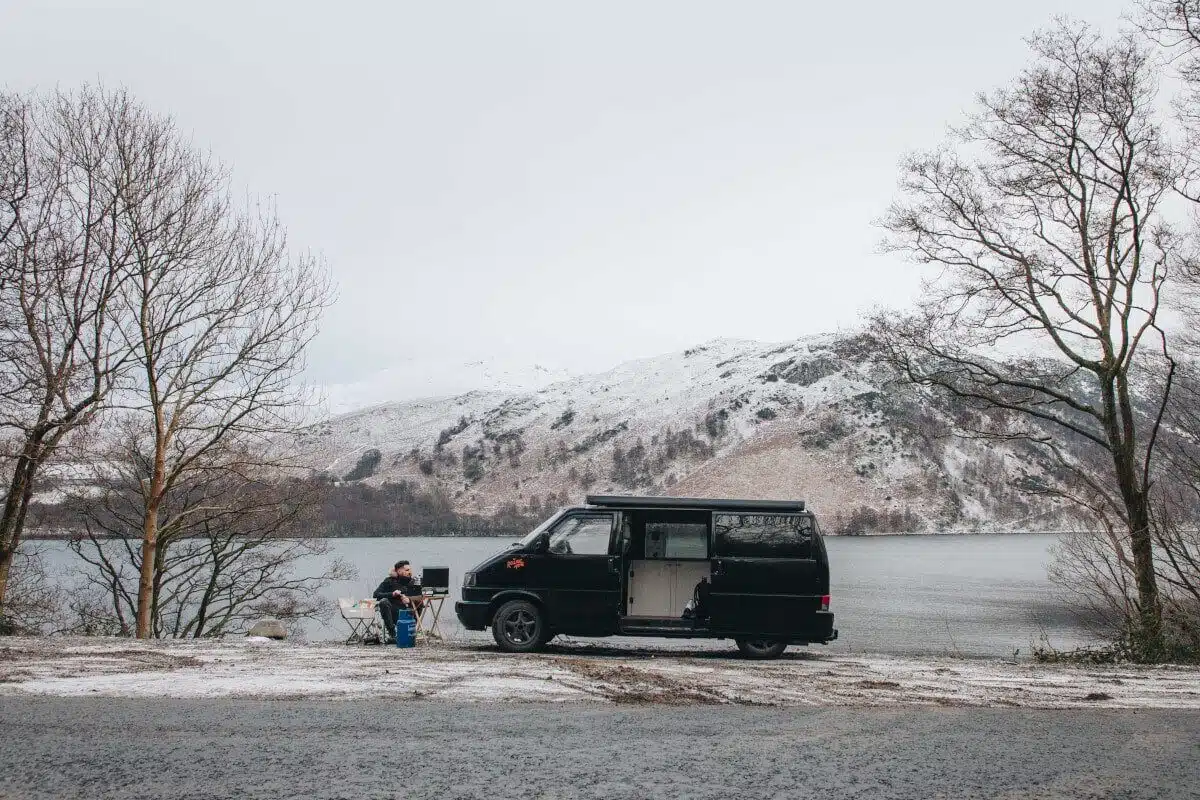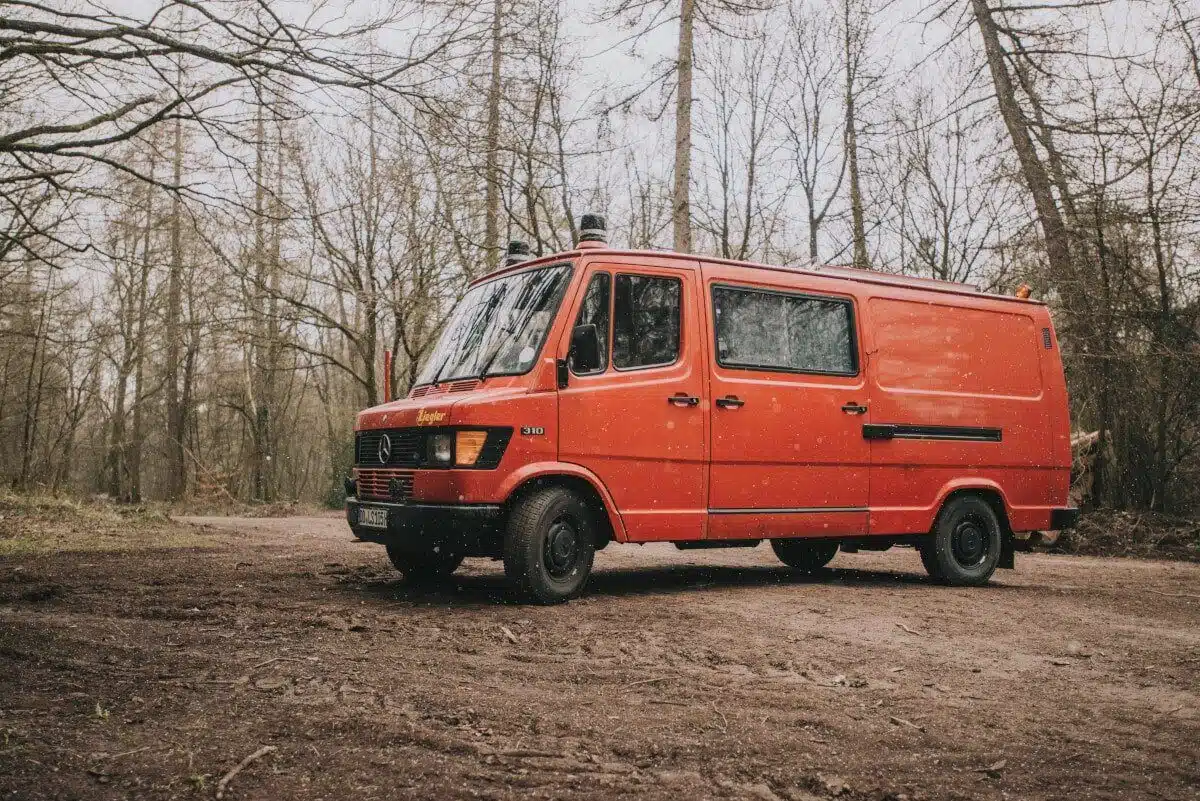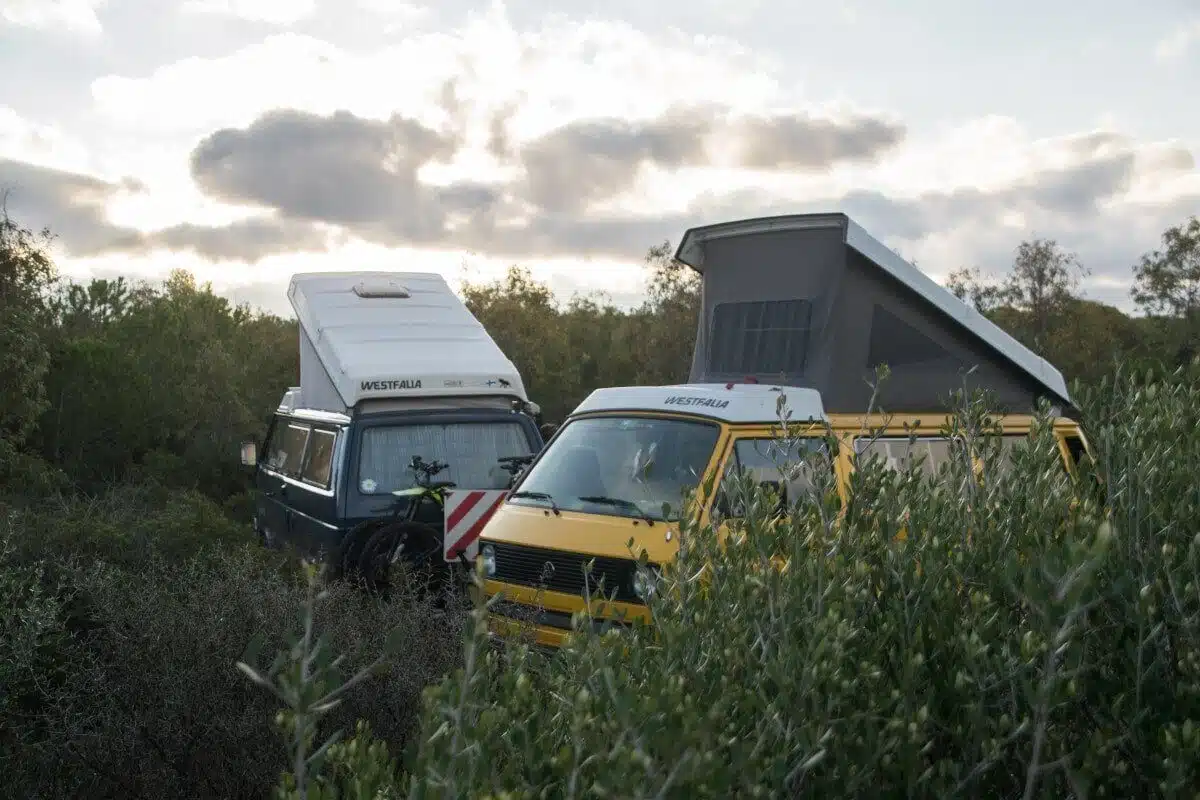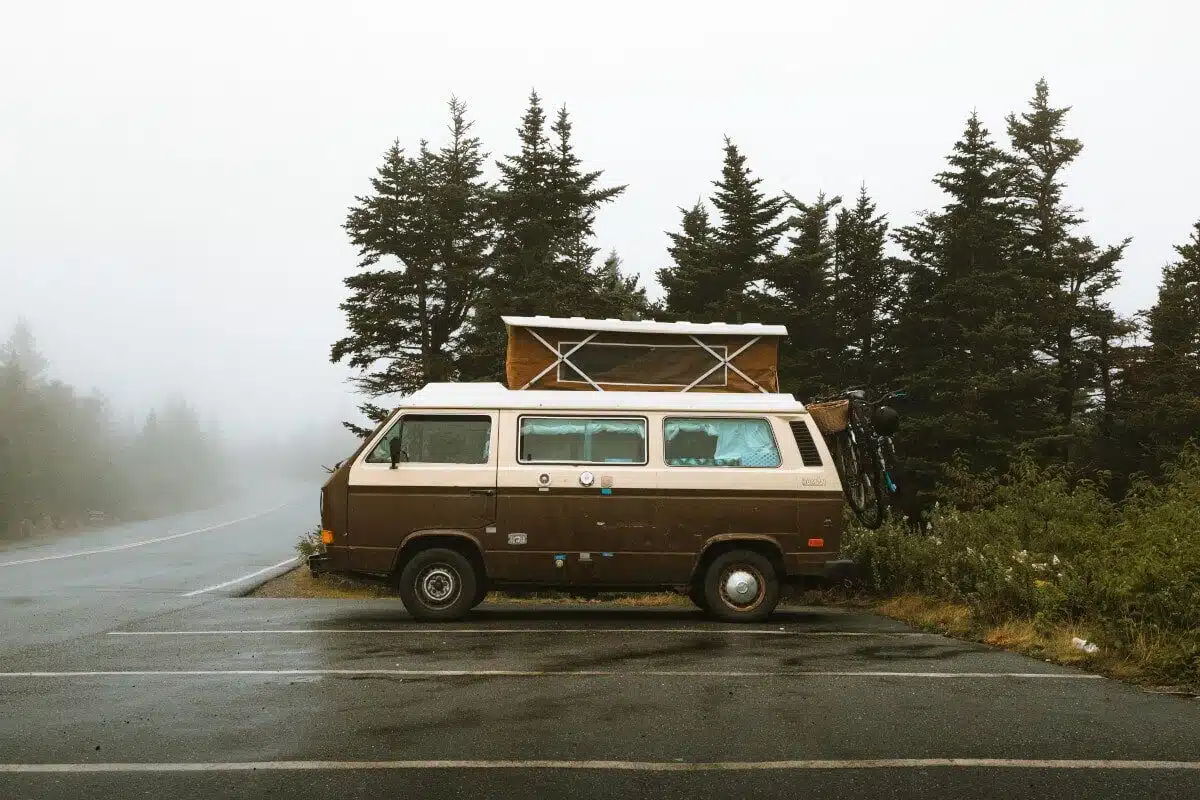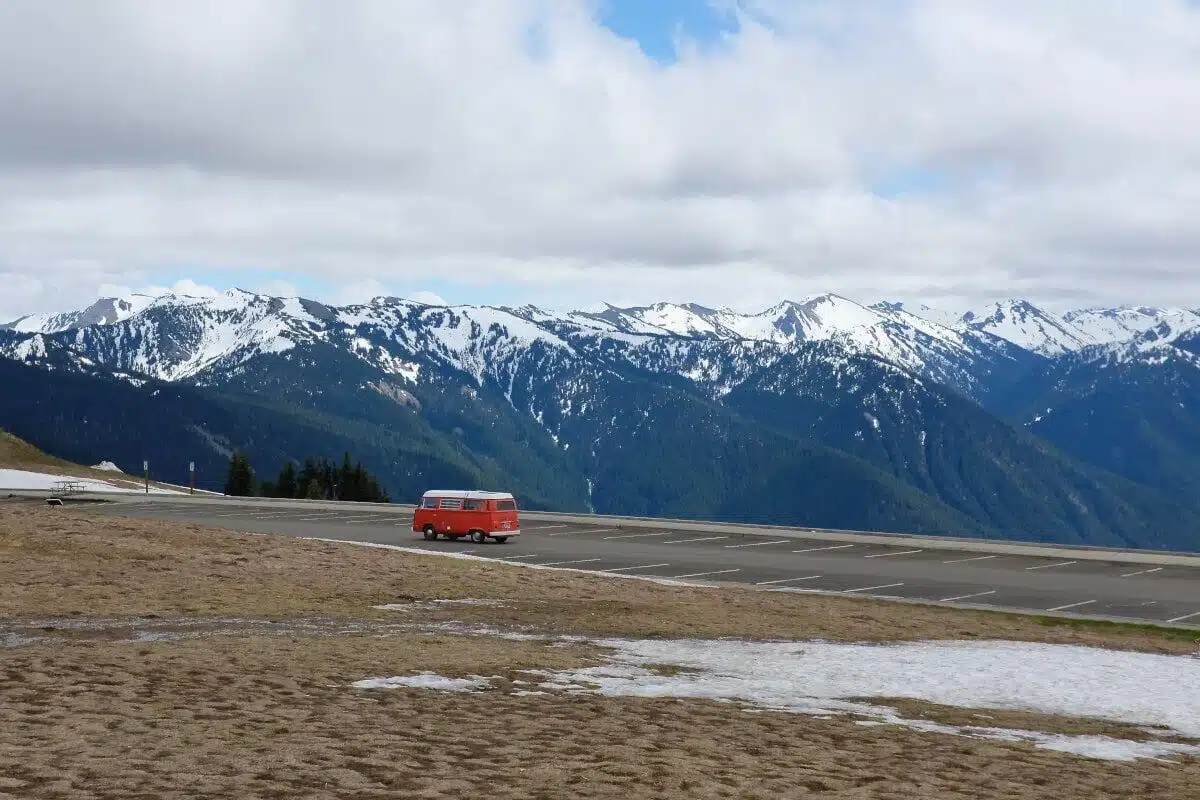Trying to find the best campervan heaters? I hope this campervan heating guide helps!
Now, don’t get me wrong.
I love van life! You can’t beat it.
But it’s a bit like camping.
With long days and amazing weather, the warm summer months are perfect for it.
And then winter rolls around, the temperature drops, and the experience changes dramatically!
When it’s dark and dreary and the cold starts seeping into your bones, you can’t help but feel a little demoralized by life on four wheels.
Thankfully, campervan heating can make a major difference!
The best campervan heaters keep you warm and cosy whatever’s happening outside!
Moreover, they make it easier to travel to colder, icier, and snowier places that may have been off the cards otherwise.
The hard part’s knowing which one to buy.
With that in mind, I thought I’d put together a guide to a) heating a van and b) finding the best campervan heaters for the job. I hope it helps!
Heads up, this post contains affiliate links.
Ready to learn all about heating a van? Let’s get into it…
Important Campervan Heating Considerations
It might be tempting to go right out and buy the first campervan heater you find on special. But try to resist!
There are a few things to keep in mind to ensure you get the best one for the job:
1. The Need for a Camper Heater
Firstly, do you even need one?!
Think about where and when you’ll be travelling.
How cold is it going to get?
Anyone in warmer climates can probably save some cash and make do with other basic methods of campervan heating (more on this later).
Indeed, in my experience, the reality of travelling in such small, enclosed spaces is that they heat up anyway- especially if you’re a warm sleeper like me!
You might find that it’s only in really cold conditions that the best campervan heaters are worth buying.
Of course, another consideration is how long you’re going to spend in the van.
If you’re living in it full-time, then you’ll probably benefit from a camper heater at some point.
If you’re more of a weekend warrior, though, you could get away without one.
2. The Type of Heater for Campervans
The second most important consideration is which type of campervan heating system you want to purchase!
There are different possibilities, each one with its own pros and cons.
Here are the main ones:
a) Campervan Diesel (and Gas) Heater
Diesel van heaters are probably the most popular options on the market.
They generally fit beneath one of the seats in the cabin and use fuel from the tank (i.e. the same fuel used to drive the van) to function, making them incredible convenient.
Expect high installation costs followed by budget-friendly running costs.
Ventilation systems mean they’re safe to run as well.
b) Campervan Electric Heater
Another popular option, 12V electric campervan heaters come in a variety of shapes and styles, including those you fill with oil.
The main benefits? Size, weight, and affordability!
Oh, and safety.
With no flammable fuels or carbon monoxide risk, you can run these bad boys without worrying as much about worst-case scenarios.
The downside?
They could drain your power supply unless you’re hooked up to the mains.
c) Campervan Propane Heater
Cost effective and readily available, propane heaters are versatile options that are great whether you spend days or months on end on the road.
Even better, the tanks you buy can fuel your other campervan gear as well!
Need a serious source of heat? A propane furnace could be perfect.
Whatever propane heater you opt for, though, having a carbon monoxide detector and an effective ventilation system will be crucial.
d) Campervan Wood Stoves
If you love caveman TV, then a wood stove could be the ideal type of campervan heating for you.
Cosy, functional, and cost-effective, wood stoves are popular among van-owners with enough space to install them.
As for the cons, these heaters are usually quite large, tricky to install, and require a bunch of other gear to accompany them.
Among others, you’ll have to buy a carbon monoxide detector, vent pipe, fan (powered by the heat), and a chimney cap.
Another key consideration for choosing the right heater for a campervan is the type of fuel it uses.
3. The Fuel Supply for Van Heaters
As you can tell, different heaters for campervans use different types of fuel.
And each one has its own relative pros and cons!
When it comes to selecting the right fuel type, make sure you consider things like:
- Cost (of installation, maintenance, and refills)
- Safety (more on this next)
- Availability (dry wood might be everywhere, but gas stations may not)
- Room (do you have space in the van for spare fuel? Where will you store it?)
4. The Safety Level of Different Campervan Heaters
Anytime you do anything with gas, heat, flames, or fuel inside a van you open the door to trouble.
(Ironically, opening the door is usually a quick way to resolve the issue…)
With everything from fires to gas leaks on the cards, taking action to prevent such issues from arising is key.
To keep everyone safe, make sure:
- The van heater’s installed properly (get a pro to do it if you’re unsure how!)
- You know how everything works
- You understand the potential hazards
- You stick to the necessary maintenance as stated in the user manual
- Take action to avoid fires (e.g. keep the heater away from flammable items)
Oh, and last but not least, make sure you have a functioning carbon monoxide detector in the van at all times!
Known as “the silent killer” for its lack of smell, carbon monoxide can build up in enclosed spaces whenever you’re using things like gas-powered cookers and heating systems.
A fire alarm and extinguisher would be valuable investments too.
Of course, the right camper heater has to actually fit inside your camper as well! So, always take size and space into account before buying one.
Related posts you might like:
- 5 Best Awnings for Campervans (Buying Guide)
- 25 Cool Gadgets for Campervans
- 101 Quick and Easy Campervan Hacks
- 12 Best Campervan Cooker Options (Buying Guide)
- 30 Essential Van Camping Accessories
- Top Tips for Full-Time RV Living
- 25 Fun RV and Camper Accessories
- 100 Best Gifts for RV and Camper Owners
- 85 Road Trip Trivia Games and Questions
5. The Space Required for a Heater for Camper
Vans come in all sorts of different sizes, right?
Just look at a Mercedes Benz Sprinter with a long wheel base and a Mazda Bongo!
It’s important to find a heater that fits in the space you have available.
So take some measurements before you go shopping!
Big campers are more likely to have room for big heaters. What’s more, they’ll probably need a bigger unit to heat all the extra space.
Small van? You’ll want a smaller unit.
6. The Budget You Have for Heating a Van
The final thing to think about when searching for a heating system is money.
Unfortunately, the best campervan heaters aren’t cheap! And remember, it’s not just the cost of the unit you have to bear in mind.
There’s the price of installing, running, and maintaining it to consider as well.
Try to find one that strikes a balance between cost and quality. You’re onto a winner if it’s affordable up front, reasonable to run, and promises to deliver a hefty (and reliable) dose of heat for years to come.
With the considerations down, here are 5 of the best campervan heaters on the market right now.
The 5 Best Campervan Heaters
With all that said, let’s move onto a selection of the best campervan heaters on the market today.
1. Aikoper 1500W Space Heater
Type: Electric
Compact, versatile and powerful, the 1500W electric heater from Aikoper would be a great option for anyone with a smaller van.
Highly rated and supremely popular online, it heats up quickly, boasts 3 heat settings, and has a fan mode to help distribute warmth.
Another handy feature is the thermostat that’s included.
Simply set the temperature you want the heater to emit and away you go!
And for safety?
An automatic kill-switch turns the Aikoper off whenever it’s tilted over. There’s also an “advanced overheat protection sensor” to prevent it from getting too hot.
As for downsides, the main potential issue is that it isn’t a 12V electric campervan heater. That means you’ll have to use an inverter in order to heat your van with it.
Pros
- Compact
- Lightweight
- Portable
- Cheap!
- Useful safety features
- 3 heat settings and a fan mode
Cons
- Doesn’t run on 12V
- You can’t adjust the fan speed, meaning you can’t reduce the noise level either
–> Click here to learn more about the Aikoper heater!
2. Fltom Indoor Stove with Chimney Pipes
Type: Wood stove
Compact and budget-friendly (as far as wood stoves go!), this Fltom stove is actually designed for use in hot tents.
However, with the 6-piece chimney sections included, I can’t see anything stopping you from installing it in your van conversion! In fact, even the description in the listing notes that it’s suitable for use in tiny houses.
This is by no means the fanciest, most well-made stove you’ll come across.
Yet it seems fairly robust and comes with hundreds of 5* reviews too, so it has to be doing something right! And, for the price, it’s hard to beat.
One feature I like in particular is the flat top, which you can cook use for cooking.
Otherwise, you’re looking at a small, versatile, and simple wood stove that’d certainly keep your van warm in the winter.
Pros
- Relatively compact
- Relatively affordable
- You can cook on the top surface
Cons
- You have to build and install the stove yourself
- Burns through wood quickly
–> Click here to learn more about the Fltom heater!
Buying a propane heater like the one below is one of the simplest options for heating a campervan in winter.
3. Mr. Heater F274800
Type: Propane
A highly popular and top-rated propane heater, the Mr. Heater’s comes with thousands of rave reviews online.
Measuring 18.5 x 18 x 11.4 inches, it’s fairly compact, yet still promises to heat spaces up to 450 sq. ft.
In other words, it’d keep your campervan nice and toasty!
It’s also clean-burning, provides a max of 220 hours of operation, and boasts 3 heat settings (low, medium and high).
As for safety, Mr. Heater will shut off automatically if a) it tips over, b) the pilot light goes out, and c) in low oxygen environments.
Pros
- Effective campervan heating system
- Seems durable and well-made
- Comes with important safety features
- 220 max hours of operation per tank of propane
Cons
- Propane tank not included
- May not work over 7,000ft above sea level
–> Click here to learn more about the Mr. Heater heater!
4. Webasto AT 2000
Type: Diesel 12V Air Heater
A brand that comes highly recommended among van-life aficionados, Webasto heaters are meant to be the real deal.
Now, they’re definitely not cheap.
But you get what you pay for, right?
Expect a quiet, compact, and effective diesel heater that uses minimal fuel to operate, plus a multi control HD timer and everything you need for the installation.
Nicely, there’s also a 2-year warranty, instructions on how to install the heater, and 24/7 support. If you want a reliable product from a reputable business, then this seems to be the one.
Pros
- Compact
- Efficient and effective van heating system
- Widely recommended online by van-lifers
- Built-in temperature control
Cons
- It’s expensive!
- You might need to hire someone to install it for you
5. MaXpeedingrods 12V
Type: Diesel 12V 5KW 5000W
Looking for a diesel campervan heater that won’t break the bank?
This one from maXpeedingrods could be ideal.
A fraction of the price of the Webasto above and with over 1,100 reviews (almost 75% of which are rated 5-stars), it definitely comes with a seal of approval from past customers.
With 5KW of power, it should heat a 15m² space without any trouble and can supply continuous heat for 48 hours. There’s also a programmable timer and a remote control to handle the temperature from afar.
The only complaint you tend to see is to do with noise from the fuel pump.
However, if you mount this outside (where one reviewer says it’s supposed to be), or use a muffler (as another reviewer did), then you shouldn’t have to worry.
Pros
- Budget-friendly
- Energy-efficient
- Effective campervan heating
Cons
- Professional installation’s recommended
- May need an added muffler to limit the noise
- Reads in Celsius not Fahrenheit!
–> Click here to learn more about the maXpeedingrods heater!
Heating a campervan isn’t all about actual camper heaters! Here are some other important ways to ensure you stay warm and toasty inside the van.
Alternative Heating for Campervans Ideas
Buying a campervan heater is arguably the best way to heat a campervan in winter.
However, you don’t always need one to stay warm and cozy inside.
The real magic happens when you invest in a camper heater alongside insulating the van and being proactive about staying warm!
Here’s how to do it:
1. Install Wall and Ceiling Insulation
Having stayed in multiple vans that lacked any form of insulation in the walls, I highly recommend installing some in yours!
Whether it’s really hot or cold out, life in the camper’s going to be far more comfortable.
Oh, and you’ll enjoy better soundproofing to boot.
The installation process should be pretty simple if you’re converting the van too.
Grab yourself some foam boards or Thinsulate, measure out the lengths you need, cut the insulation to size, and then fit it along the main panels/walls (with adhesive spray, for example, or by setting them into the nooks and crannies).
2. Lay Down Rugs or Carpet
Nobody likes chilly feet, right?
Thankfully, laying warm carpet (or a few woollen rugs) on the floor will:
- Limit the amount of cold air that gets in from underneath the van and
- Stop the heat inside from escaping.
It’ll make a pleasant change from the cold vinyl that usually lines the floors of campers and RVs!
3. Cover the Windows
Campervan windows are ideal for letting light in and providing awesome views of the outside world.
But they’re also a primary source of heat transfer in the vehicle!
With nothing insulating them, you can expect unfortunate levels of heat to come in during the summer months and escape in winter.
Everything from well-fitted curtains to specific thermal barriers like Reflectix can solve the problem.
In the winter months, be sure to keep the curtains drawn to help keep the heat in.
4. Buy Thick Winter Bedding
Van-life in winter will be 10x better with a wonderfully thick duvet on your bed!
It’ll keep you warm at night and add to the cosy vibes of being inside the camper.
Depending on how cold it’ll be, though, you might also want some extra blankets to go on top. Oh, and having a thick, breathable mattress topper beneath you will make a mighty difference too.
Likewise, if it’s going to get really cold, you could even think about buying an electric blanket. Just be wary of the demands it’d put on your power supply.
Don’t forget to pack the right winter clothers alongside buying the best heater for campervans!
5. Wear Warm Winter Clothes
This one almost goes without saying.
However, given our modern-day reliance on central heating, it might be worth mentioning…
Basically, don’t forget the benefits of warm clothes!
When the temperature drops, try putting on a hoodie, jersey, jacket, and/or a hat before you crank your heater into 5th gear.
It’s the best way to stay warm without eating into your limited fuel supply.
6. Hot Water Bottles Never Hurt
Stash a hot water bottle or two in the campervan as well!
When it’s icy cold outside, there’s nothing better than stepping into a pre-warmed bed and warming your butt with the hot water bottle.
All you have to do is boil up some water to enjoy hours of warmth.
Combine that with the winter bedding and you’ll be snug as a bug in a rug.
Be sure to install adequate ventilation whenever you’re choosing a heater for a camper too!
7. Don’t Forget to Install a Ventilation System
One final thing to mention here is the importance of ventilation in the van.
It seems counterintuitive.
After all, you’re trying to stay warm and won’t that ventilation allow the heat out?
A little, perhaps. But it’s a small price to pay for the air flow that it enables.
With no ventilation, the air inside the van will heat up, become moist and stuffy, and begin to cause condensation as well.
Left unchecked, that dampness can lead to mould and other nasty outcomes.
Remember This Guide to Heating a Van
There’s nothing fun about being cold in your campervan.
So, next time you’re wondering how to stay warm in the winter, go out and grab yourself one of the best campervan heaters possible!
These compact, versatile campervan heating systems will make a mighty difference when the temperature begins to drop.
With no shortage of camper heaters out there, though, selecting one for the job can be easier said than done.
Know the struggle?
Well, I hope the information in this guide to heating for campervans will help you choose the best possible product for the job!
And if you’re still looking for the perfect camper? Check out my guide to buying a van next!

